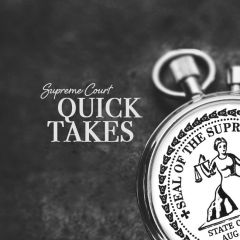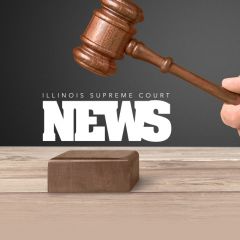The Illinois Supreme Court handed down three opinions on Thursday, June 4. In People v. Coty, the court declined to extend the protections of Miller v. Alabama, 567 U.S. 460 (2012), to an intellectually disabled adult. In Williamson County Board of Commissioners v. The Board of Trustees of the Illinois Municipal Retirement Fund, the court found that amended section 7-137.2(a) of the Illinois Pension Code was unconstitutional. In Rios v. Bayer Corp., the court dismissed the case for lack of specific personal jurisdiction over an out-of-state defendant as to the claims of out-of-state plaintiffs for personal injuries suffered outside of Illinois from a device manufactured outside of Illinois.
Practice News
-
June 4, 2020 | Practice News

-
June 4, 2020 | Practice News

The Illinois Supreme Court Rules Committee will hear comments on June 24, 2020, at a remote public hearing via the Zoom videoconference platform on seven proposals, including a proposal to require all written opinions by the Appellate Court to be published and a proposal to create a new Supreme Court Rule that would require all eviction complaints to include a copy of the written eviction notice or demand.
1 comment (Most recent November 9, 2020) -
June 1, 2020 | Practice News

In the Illinois Bar Journal’s June cover story, “Search and Assist,” Thomas Hamilton, vice president of strategy and operations for the legal-research firm ROSS Intelligence, tells the IBJ that “[t]o the extent that lawyers—especially sole practitioners and partners at small firms—also are business people, there’s an enormous suite of AI tools they can leverage to run a more profitable and streamlined business. At the same time, in their capacity as legal professionals, there are now AI tools available that allow them to provide higher-quality work more efficiently and effectively.” Thomas and other technology experts discuss the fast-evolving ways artificial intelligence is making a home in the legal industry, to your benefit.
-
May 26, 2020 | Practice News

The Illinois Supreme Court announced today that on June 1, 2020 the Supreme Court Clerk’s Office will begin offering an option for attorneys to request a Certificate of Good Standing online through a link on the Supreme Court’s website.
Attorneys shall make a request for a Certificate of Good Standing by filling out requested information and then paying the $15 fee electronically on the Illinois State Treasurer’s ePAY site, a full-service electronic payment program specifically designed for Illinois governments. Additional copies will cost $5 each.
-
May 26, 2020 | Practice News

An underdiscussed but vitally important aspect of today’s criminal justice system is the ever-expanding role of assessments charged to convicted defendants in criminal cases. These fines and fees charged by states and municipalities aim to minimize the cost of criminal prosecutions on the taxpayers and deter future criminal activity. Nationally, convicted persons are charged an average of $13,607 for conviction-related costs, including restitution and attorney fees. As Benjamin Sardinas notes in his May Illinois Bar Journal artilcle, “The Ball Is in Your Court,” nearly half of convicted persons’ families who helped cover those costs say they could not afford such fees and 38 percent of those families found court fees and fines the most difficult among the costs of conviction. Since the passage of Illinois Supreme Court Rule 472, correcting errors in the calculation and imposition of court assessments have become part of the responsibilities of trial prosecutors and defense attorneys. Sardinas reviews the history of correcting errors in sentencing, the changing legal landscape in the wake of Rule 472, and suggests how criminal trial attorneys may challenge assessments and sentencing errors to prevent their incidence and prevalence.
-
May 22, 2020 | Practice News

Chief Justice Anne M. Burke and the Illinois Supreme Court announced today the repeal of Supreme Court Rule 185, creation of new Rule 45, and amendments to Rule 46 and Rule 241. These rules all relate to the use of remote hearings via telephone or video conferencing in the courts and the official recording of these court proceedings. The rule changes are effective immediately.
-
May 22, 2020 | Practice News

The Illinois Supreme Court announced today a temporary order to harmonize the current procedure for eviction cases during the COVID-19 pandemic with new federal requirements recently adopted as part of the Coronavirus Aid, Relief, and Economic Security Act (CARES Act), which was passed by Congress and signed into law on March 27, 2020.
The goal of this order is to ensure there are no inadvertent violations of the new federal law during the pandemic that would result in improper and unnecessary evictions at such a difficult time for residents of Illinois.
-
May 21, 2020 | Practice News

The Illinois Supreme Court handed down three opinions on Thursday, May 21. In People v. Green, the court weighed in on conflict-of-interest issues when an attorney has represented an intended victim of a crime where another person turns out to be the actual victim. In Levin v. Retirement Board of the County Employees’ & Officers’ Annuity & Benefit Fund, the court upheld an appellate court decision that a county board exceeded its authority in denying an employee health insurance because she was previously a state employee. In Lewis v. Lead Industries Association, the court held that plaintiffs in a class action lawsuit to recover the costs of lead screening undergone by their children had no claim.
-
May 20, 2020 | Practice News

The Illinois Supreme Court today issued an order and operational guidelines to help courts statewide resume in-person operations and establish procedures for remote hearings. Since mid-March, the state’s courts have been operating under precautionary measures to minimize the spread of COVID-19 while continuing to conduct emergency and essential matters.
-
May 18, 2020 | Practice News

The Illinois Supreme Court announced the filing of lawyer disciplinary orders on May 18, 2020. Sanctions were imposed because the lawyers engaged in professional misconduct by violating state ethics law.

